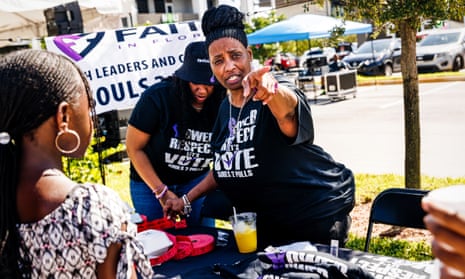DeSantis eyes revoking constitutional safeguard for Florida’s Black voters
“The state’s Republican governor is already appealing a judge’s decision to strike down unlawful election maps

In mid-August, lawyers representing Florida Republicans made a startling admission. The state’s new congressional map, drawn by governor Ron DeSantis, made it harder for Black voters in north Florida to elect the candidate of their choosing. On Sunday, a judge in Florida ruled the map was unlawful.
From 2016 until last year, Florida’s fifth congressional district had stretched more than 150 miles across the northern part of the state, from Jacksonville to just west of Tallahassee. It was a portion of the state once home to the Ku Klux Klanand lynchings. In 2022, it was represented by Al Lawson, a Black Democrat, and 46% of eligible voters were Black.
That year, DeSantis went out of his way to chop the district up into four majority-white ones, all of which elected a Republican last fall.
“It limits their voice. It limits their representation in Congress. It limits the goods and services that they are expected to receive,” said Jasmine Burney-Clark, the founder of Equal Ground, a voter engagement non-profit that challenged the maps. “The needs from north Florida are different from south Florida. The representation should match those needs as well.”
It was the kind of concession that politicians, wary of doing anything that could be perceived as motivated by racial animus, rarely make. And it was particularly striking in Florida, where a provision in the state’s constitution specifically outlaws diminishing the influence of Black voters in that way. Voters overwhelmingly approved that provision as part of a set of anti-gerrymandering reforms, called the fair districts amendment, in 2010.
So it was no surprise that circuit judge J Lee Marsh struck down the map. “Under the stipulated facts [in the lawsuit], plaintiffs have shown that the enacted plan results in the diminishment of Black voters’ ability to elect their candidate of choice in violation of the Florida constitution,” he wrote in his ruling.
“It’s more like common sense,” said Brenda Holt, a Democratic county commissioner in Gadsden county, which was on the western edge of Lawson’s old district and is the only majority-Black county in Florida.
DeSantis is already appealing the ruling and the case is likely to be decided by the Florida supreme court, where he has appointed five of the seven justices. And the governor has his sights set on an even bigger goal – getting rid of the protection in the state constitution altogether. It’s an aggressive legal gambit that’s part of a broader conservative push in the courts to limit considerations of race in redistricting, even when it’s being used to protect voters of color.
The most sweeping reading of the state’s argument is “that there are an extremely narrow set of circumstances in which states can do anything to remediate discrimination in a way that takes race into account at all”, said Nicholas Warren, a lawyer with the Florida chapter of the American Civil Liberties Union. “DeSantis wants to provoke the ultimate win. He wants to have the battle.”
While there are legal battles over Black representation in redistricting underway across the US south, the fight in Florida is unique. Other cases are focused on whether states like Alabama and Louisiana are required to add districts to ensure Black voters can choose their preferred candidate, but the Florida case is the only one that involves dismantling an existing district that was allowing Black voters to do so.
In 2015, the Florida supreme court ordered the state to adopt the current configuration of the fifth congressional district to preserve the ability of Black voters in that part of Florida to elect the candidate they want – most recently Lawson. Once the district went into place, it became illegal for the state to get rid of it under the Florida constitution.
But DeSantis hasn’t been shy about saying he thinks the bar on diminishment is itself illegal. Drawing the district, lawyers for the state argued, requires mapmakers to go out of their way to consider race. That consideration, they argue, violates the 14th amendment, which guarantees equal protection of law to all citizens.
Republicans made a similar argument in Alabama, where they have fought aggressively in the federal courts to avoid having to draw an additional district giving Black voters the ability to elect their preferred candidate. Doing so, lawyers for the state argued, would require them to prioritize race above other race-neutral criteria. The US supreme court brushed back the argument, ruling in June that Alabama had to redraw its congressional map.
“When it comes to considering race in the context of districting, we have made clear that there is a difference ‘between being aware of racial considerations and being motivated by them’,” chief justice John Roberts wrote for a five-justice majority. “The former is permissible; the latter is usually not.”
While the Florida case is unique because it involves a state-based constitutional provision, it could have broader implications if it reaches the US supreme court, said Mark Gaber, the senior director of redistricting at the Campaign Legal Center, a non-profit group. The court could be forced to decide whether “the history of past discrimination makes it constitutional to prohibit the diminishment, the retrogression, of minority voting strength”, Gaber said. Its decision could affect a handful of other states that have implemented their own standards barring retrogression.
Regardless of what happens with future appeals, Burney-Clark said it still was meaningful for Black voters to get a victory in court.
“It felt like freedom. It felt like we were being unshackled from the belief that our votes do not count or that they do not matter,” she said.“
No comments:
Post a Comment